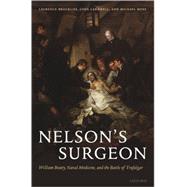Nelson's Surgeon William Beatty, Naval Medicine, and the Battle of Trafalgar
, by Brockliss, Laurence; Cardwell, John; Moss, Michael- ISBN: 9780199287420 | 0199287422
- Cover: Hardcover
- Copyright: 12/1/2005
In the lead-up to the bicentenary of Trafalgar a number of important new studies have been published about the life of Nelson and his defeat of the Combined Fleet in 1805. Despite the significant role played by the health and fitness of the British crews in securing the victory, little hasbeen written hitherto about the naval surgeon in the era of the long war against France. This book is intended to fill the gap. Sir William Beatty (1773-1842) was surgeon of the Victory at Trafalgar. An Ulsterman from Londonderry, he had joined the navy in 1791. Before being warranted to Nelson'sflagship, Beatty had served upon ten other warships, and survived a yellow fever epidemic, court martial, and shipwreck to share in the capture of a Spanish treasure ship. After Trafalgar, he became Physician of the Channel Fleet, based at Plymouth, and eventually Physician to Greenwich Hospital,where he served until his retirement in 1838. As the book makes clear in drawing upon an extensive prosopographical database, Beatty's career until 1805 was representative of the experience of the approximately 2,000 naval surgeons who joined the navy in the course of the war. The first part of the biography provides a detailed and scholarly introduction to the professional education, training, and work of the naval surgeon. But after 1805 Beatty became a member of the service elite, and his career becomes interesting for other reasons. In the final decades of his life,Beatty was far more than a senior naval physician. As a Fellow of the Royal Society, director of the Clerical and Medical Insurance Company, and director of the London to Greenwich Railway, he was a prominent figure in London's business and scientific community, who used his growing wealth to builda large collection of books and manuscripts. His later life is testimony to the much wider contribution that some naval and army medical officers made to the development of the new Britain of the nineteenth century. In Beatty's case, too, the contribution was original. By publishing in 1807 hiscarefully crafted Authentic Narrative of the Death of Lord Nelson, he was instrumental in forging the myth of the hero's last hours, which has become a part of the national consciousness and has helped to define for generations the concept of Britishness.







